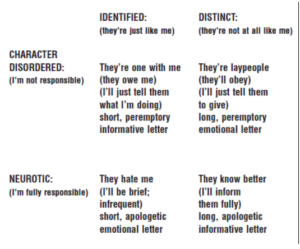What kind of ministry marketer are you?
A ministry marketer is either “neurotic” or “character disordered,” and either “identified” or “distinct.”
The combinations of these traits are reflected in how you communicate with your donors.

Which are you?
- Identified, Character Disordered
This is the person who says to himself, “The donor is just like me — so much so, in fact, that I can just tell her what I’m doing, and she’ll understand instantly and get on board.”
This person, then, tends to prefer short, staccato communications with his donors — one-page letters, emphasizing information over emotion. “I don’t have to ring her bell,” he tells himself, “because this ministry thrills her the same way it thrills me!”
This thinking often leads to the creation of donor communications with a “peremptory” tone — the tone that suggests the donor somehow “owes” the ministry a response. There’s little or no effort to excite the donor’s interest or imagination. Mail packages and emails sent to donors tend to feel like basic collection devices.
- Identified, Neurotic
This marketer sees the donor as himself, but worries about that. He assumes the ministry is intruding on the donor’s life in an unpleasant way. So he tends to send very short communications to donors, and rarely.
In some cases this type of marketer may tend to rely more on emotion than information — based on the feeling that “I don’t want to bog the donor down with lots of data.”
- Distinct, Character Disordered
This is the marketer who tends to say to himself, “The donor isn’t like me; the donor needs to be told what to do” — but who also fails to feel responsible for the care and keeping of the relationship with the donor.
Such a view often results in donor communications which overwhelm the donor with passionate pleas for help — direct mail letters and email communications in this case tend to be longer and more emotional, with the feeling of “This is so important, you’ve just got to help me!” There’s a sense of “you just don’t understand” in these letters — an accidental talking “down” to the reader.
- Distinct, Neurotic
Here’s the marketer who feels that the donor must be enormously suspicious of the ministry, so he responds by overwhelming the donor with information. Letters and emails tend to be long and jammed with detail, but not much emotion.
Each of these four types of marketing “personalities” has its own weaknesses — and thank goodness, most of us aren’t extreme examples of any one of the four. But observing the natural inclinations of the four in their “pure” form may help us identify our own weaknesses.
Contact us for more information — or for help in identification!


